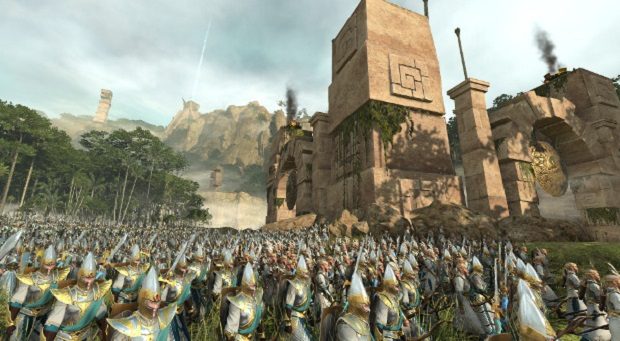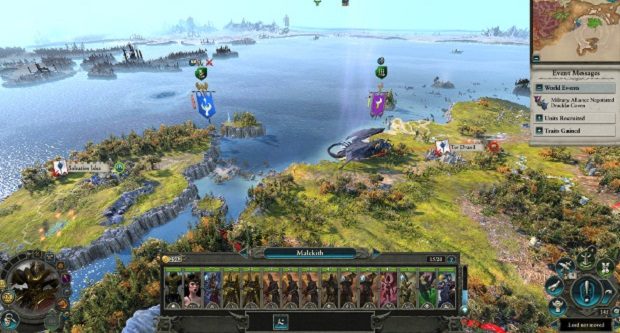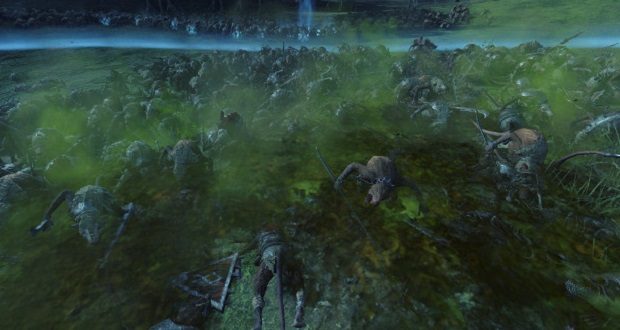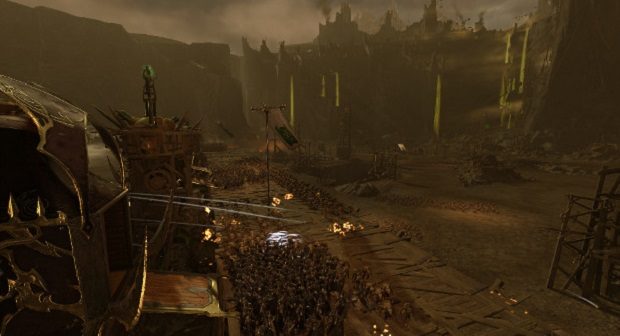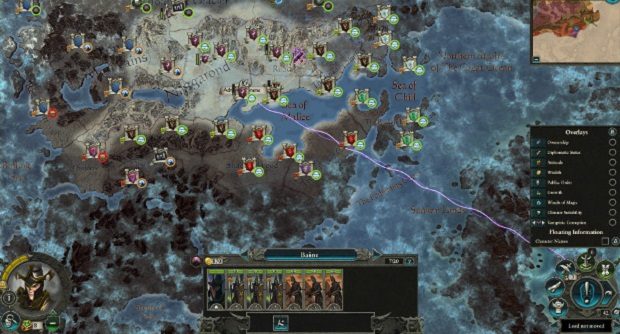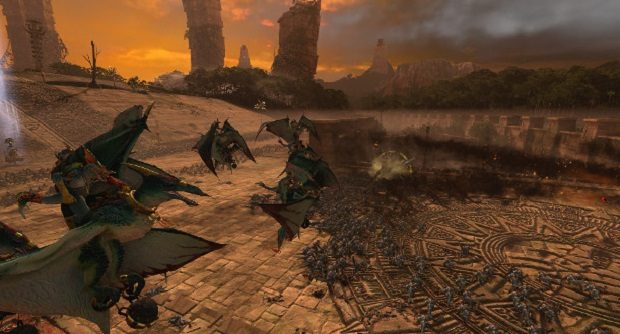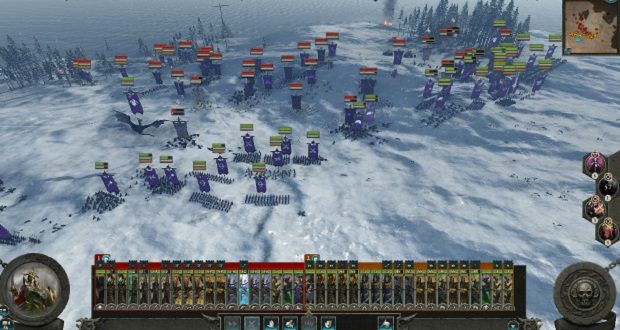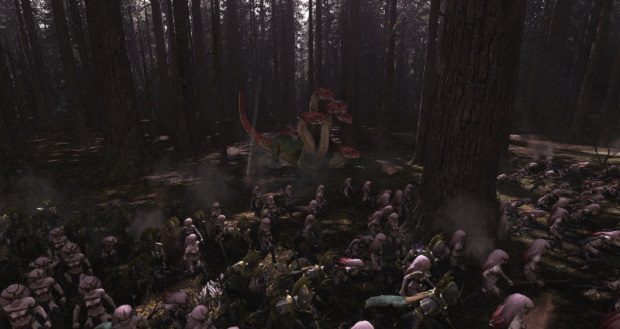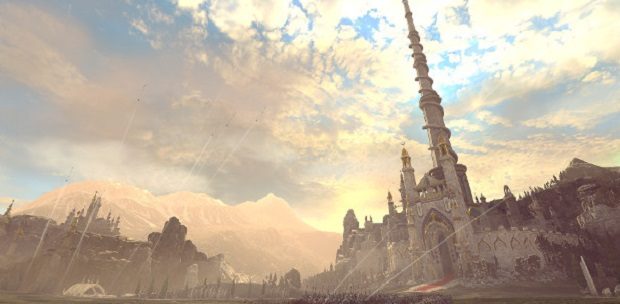Wot I Think: Total War - Warhammer 2
That's so Skaven
In three more turns, the ritual will be complete, and I’ll be one step closer to controlling the Vortex that holds the forces of Chaos at bay. In two more turns, Skaven and Chaos armies will be at the gates. I’m surrounded. By land and sea they arrive, this howling mass of warped warriors and chittering rat-men. Army, after army, after army, all attempting to stop the ritual. Total War: Warhammer 2 [official site] is a race, and it's an utterly savage one.
From the safety of the other side of that campaign I can tell you that I survived. Just. Reinforcements made it in time, slaughtering the rats and warriors by their hundreds. It was touch and go for a bit, though, which is fairly typical of Creative Assembly’s bloodthirsty sequel.
Warhammer 2 is massive but like the best Total Wars - Shogun 2, Attila and post-DLC Warhammer - it's blessed with a focus that keeps the titanic scale of the campaign and battles from becoming too exhausting. Previous games in the series have found focus in different ways - Attila uses the devastation wrought by the Huns, while Shogun 2 uses its limited landmass - and those that haven't directed the players' experience at least a little have often collapsed under their own weight.
With Warhammer 2, Creative Assembly have found a way to have their cake and eat it too. It's one of, if not the, largest and most complex game in the series' history, but it's also one of the most focused.
This is largely down to the non-traditional main campaign. Typically, the launch of a new Total War is accompanied by a new grand campaign, a huge sandbox with limited direction. With Warhammer 2, we get the Vortex campaign instead. While its scale is that of a grand campaign, it’s more directed, complete with shared objectives that dramatically change the flow of the game. And most surprising, it comes with a proper story, told through lavish cutscenes.
Instead of being a straightforward domination game, Warhammer 2 has two paths to victory. The first one is closer to what you’ll probably be used to: beat the crap out of everyone and take over the world. The second objective makes things much more interesting. At the heart of the High Elf realm sits a large maelstrom, the campaign’s titular Vortex. Created by the Elves, it stops Chaos from leaking into their world. But it’s been weakened, and each of the four playable factions is in a race take control over it for their own reasons.
To gain mastery over the Vortex, each faction must gather up Vortex currency by establishing new settlements, completing quests and constructing unique, very rare buildings in specific locations. Then, five rituals must be completed, each costing a large amount of currency. And this is where things start to get a little more complicated.
When the ritual kicks off, three settlements are selected, and they become ritual sites. For ten turns, those sites must be protected, and that’s not easy. See, everyone knows when a ritual has started, so there’s a good chance that the other factions will intervene. They might send some armies, but they might also spend gold on a one-off army that will spawn right next to one of the sites. And while this is going on, the forces of Chaos decide to pop in to say hello. And also to murder.
Performing those rituals is the most stressful situation I’ve encountered in a Total War game, and it happens at least five times a game, each attempt being more challenging than the last. There's potential for every major and minor faction in the world to get involved, and that guarantees the absurdly huge, dramatic battles that Total War does so well, while injecting some delightfully tricky encounters into every playthrough.
No part of Warhammer 2 has been left untouched by the Vortex. Missions, battles, conquest - they all serve to get you closer to taking its power for yourself. It’s the change in pace that feels like the most notable change, however. The first Warhammer provided plenty of missions, and the threat of the Chaos invasion, but ultimately it was still a game about gobbling up land. Not because huge, sprawling empires were better or even more fun to play, but because that was simply the end goal.
With domination now optional, so much busywork has been cut out. Take my Dark Elf campaign, for example. As the Dark Elf leader Malekith, I started in the north of a continent full of houses of my own race. In the previous game, the first order of business would probably involve uniting all of these houses before directing my anger outwards. In Warhammer 2, that’s not necessarily an efficient use of time or resources.
Sure, each additional settlement comes with benefits: more cash, faster recruitment, lots of unique buildings. Conquering cities is still very much part of the game and is generally a good idea, but a more objective-based approach is also required. So after conquering only my immediate neighbours, I used diplomacy with an eye towards seducing the other Dark Elves into a confederation, while I focused on more important matters. Like preparing for the rituals.
With that in mind, I picked my targets carefully. Settlements with buildings that could generate Vortex currency were at the top of my list, but they were accompanied by quests that offered magical items, cash and even more Vortex currency. These RPG-flavoured missions are more frequent than in the last game, and they’ve also been given considerably more context through important characters and story beats. Warhammer 2 doubles down by introducing treasure hunting and dungeon delving, too.
Littered throughout the land and sea are wrecks, ruins and caves that can be explored in brief Choose Your Own Adventures. The results are too random and adventures too slight, but they undoubtedly encourage exploration and, more importantly, make it more likely that you’ll bump into an enemy army or one of the neutral rogue warbands that wander across the map.
It’s a lovely map to explore, full of vibrant tropical jungles, striking frigid wastes and pleasant forests. Not sure I’d recommend a visit to the Chaos corrupted lands, mind you. The campaign map’s diversity means the battle locales are more varied as well, and not just in terms of aesthetics. Battles in the last game largely took place on very simple, flat maps. These made fights a lot easier to read, but at the cost of being tactically interesting. There are still of lot of them in Warhammer 2, unfortunately, but there are also a fair number of choke points, thick forests, river crossings, cliffs and large hills. Geography plays a much greater role, adding more meaningful decisions and thrilling clashes to battles. Desperately holding the high ground or defending a causeway against a tide of foes is always going to be more entertaining than smashing armies together on a featureless plain.
Focus is maintained, despite all of these quests, fights and treasure hunts, because the game constantly reinforces the importance of controlling the Vortex. A meter that shows every faction’s progress sits at the top of the screen, while notifications pop up whenever one of them starts or finishes a ritual. It’s a layer of pressure that never goes away.
It might be the best campaign that Creative Assembly’s ever made, but there’s something to be said for the total sandbox, set-your-own-goals approach of the typical grand campaign. I’m left wondering if this might have an impact on the Vortex’s replayable appeal, though after two playthroughs I’m certainly not sick of it yet. If that changes, then I hope it won’t be until after the launch of Mortal Empires, the mega campaign that combines both Warhammer games and their 117 factions.
None of what you’ve just read would mean anything if the Dark Elves, High Elves, Skaven and Lizardmen weren’t up to snuff, but no need to fret - Warhammer 2 boasts some of the series’ most impressive faction design to date. There’s also a great deal to unpack.
The original factions in the first Warhammer all felt like they were built around one unique hook: the Dwarven Book of Grudges, the Orcs’ WAAAGH! mechanic, the Chaos Warriors’ nomadic shtick. Warhammer 2’s factions, on the other hand, are not defined by one single thing. Instead, they’re multifaceted, each containing numerous unique mechanics and twists inspired by specific racial traits.
So the Skaven are meant to be these infinitely hungry creatures, greedy and ravenous, and this is translated into a food system. When the Skaven are well-fed they are braver, better at fighting and more content. Their food stores can also be used to immediately upgrade settlements when they’re conquered or colonised. But that food can vanish quickly, and with hunger comes cowardice, rebellion and starvation. They’re driven to be more aggressive so they can feast on captives and steal food from their enemies.
They’re all about self-interest, however, so on top of the food system is a loyalty mechanic. Giving lords more troops to command, keeping them busy and fed, offering them new gear and winning battles with them keeps them loyal. Ignore them, and they’ll eventually revolt, creating a schism in the empire. And they’re sneaky, so all of their settlements appear to other factions as empty ruins, and they favour stealthy units in battle. But they’re also engineers, so they can field flamethrowers and explosives, or use an earthquake machine to level a city.
My point is that they don’t fit inside a single box. But what’s more important than the breadth of these faction-specific mechanics is their impact on the battle and campaign layers, and it’s often pretty dramatic. The Skaven are messy. In battle, they’re a constantly moving tide, retreating and returning, and they can push that chaos onto their foes by using green warpfire that panics and giant mutants that terrify. During the campaign, they teeter on a knife’s edge, never too far away from that gnawing hunger. So they have to keep killing. Keep eating.
I had a harder time with them than I did the Dark Elves. These witchy Elves are a lot better organised, largely thanks to their grim slave-based economy. Slaves captured in battle can be put to work in settlements, making the Elves wealthier. But the more there are, the lower public order gets. If it drops to -100, then rebels show up and start throwing shade. As a cash-rich Dark Elf, it’s not too hard to maintain huge armies full of dinosaur cavalry and crossbow-wielding warriors.
The Dark Elves are also uniquely suited to invasions. So, every faction has access to a series of rites, not to be confused with the Vortex rituals. These rites require some kind of sacrifice - it’s slaves for the Dark Elves - and performing them confers everything from faction-wide bonuses to special units. They represent the most powerful abilities in the game, and include that aforementioned Skaven earthquake device. The Dark Elves also get something a bit special: Black Arks.
These are ominous floating vessels that hug the coast and have some limited building options. Their main purpose, though, is to assist in invasions by offering magical support with long-range bombardments and providing reinforcements. They’re a weapon and a floating city all rolled into one big ol’ boat, and they’ve saved my hide countless times, halting enemy rituals and reinforcing beleaguered troops at my own sites. I’ve picked a couple of the better rites to discuss here, but they’re not all game-changers. For every Black Ark there’s a boring +8 to public order.
Given that this is a direct sequel, I wasn’t sure if Warhammer 2 would feel like a new Total War or a very large expansion. It seems like using the same engine and a similar setting has freed Creative Assembly to go down paths they’ve never explored before, though. To experiment. It might also be the reason that the level of polish and user-friendliness has seen a jump, and that includes the UI. It’s smoother, clearer and customisable. But lest the past be entirely forgotten, plenty of old issues reappear.
Diplomacy - one day I’ll get tired of saying this - still doesn't feel like an organic extension of the other game systems, and is generally lacking in consequences. Want to declare war on your allies? It just takes a click of the button and barely anyone cares. Want a quick buck? Get in a war, demand cash for peace, do it again five turns later. Only the High Elves, with their ability to influence other factions, get to do anything remotely interesting with diplomacy.
Similarly, the economic and trade side of things continues to be woefully underdeveloped, despite being around forever, and doesn’t get much more complex than erecting money and resource generating buildings. They exist simply so you can make the gold that you need to create your armies. None of this comes as a shock, of course. These issues have existed for most of Total War’s history, but it's important to note that these systems still aren't particularly engaging.
When Warhammer 2 disappoints, it’s almost always when it shies away from change, letting some of Total War’s weaker limbs languish in mediocrity. There’s surprisingly little that hasn’t been reconsidered, however, and what isn’t entirely new has, more often than not, been expanded or tweaked, usually with positive results.
There’s a confidence to this game. It doesn’t need a comfortingly familiar grand campaign or a traditional structure because it has an identity separate from that of Total War; an identity where a scripted narrative can work, or where starkly different factions are more important than balance. It’s an exceedingly strong beginning to this chapter of the Warhammer trilogy and is a strong contender for the best game in the series.
Total War: Warhammer 2 is out this Thursday, the 28th of September, and will be available on Windows via Steam for £39.99.


